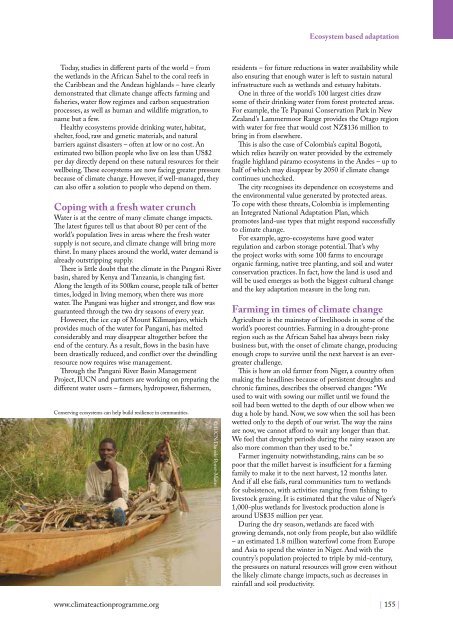Climate Action 2010-2011
You also want an ePaper? Increase the reach of your titles
YUMPU automatically turns print PDFs into web optimized ePapers that Google loves.
Ecosystem based adaptation<br />
Today, studies in different parts of the world – from<br />
the wetlands in the African Sahel to the coral reefs in<br />
the Caribbean and the Andean highlands – have clearly<br />
demonstrated that climate change affects farming and<br />
fisheries, water flow regimes and carbon sequestration<br />
processes, as well as human and wildlife migration, to<br />
name but a few.<br />
Healthy ecosystems provide drinking water, habitat,<br />
shelter, food, raw and genetic materials, and natural<br />
barriers against disasters – often at low or no cost. An<br />
estimated two billion people who live on less than US$2<br />
per day directly depend on these natural resources for their<br />
wellbeing. These ecosystems are now facing greater pressure<br />
because of climate change. However, if well-managed, they<br />
can also offer a solution to people who depend on them.<br />
Coping with a fresh water crunch<br />
Water is at the centre of many climate change impacts.<br />
The latest figures tell us that about 80 per cent of the<br />
world’s population lives in areas where the fresh water<br />
supply is not secure, and climate change will bring more<br />
thirst. In many places around the world, water demand is<br />
already outstripping supply.<br />
There is little doubt that the climate in the Pangani River<br />
basin, shared by Kenya and Tanzania, is changing fast.<br />
Along the length of its 500km course, people talk of better<br />
times, lodged in living memory, when there was more<br />
water. The Pangani was higher and stronger, and flow was<br />
guaranteed through the two dry seasons of every year.<br />
However, the ice cap of Mount Kilimanjaro, which<br />
provides much of the water for Pangani, has melted<br />
considerably and may disappear altogether before the<br />
end of the century. As a result, flows in the basin have<br />
been drastically reduced, and conflict over the dwindling<br />
resource now requires wise management.<br />
Through the Pangani River Basin Management<br />
Project, IUCN and partners are working on preparing the<br />
different water users – farmers, hydropower, fishermen,<br />
Conserving ecosystems can help build resilience in communities.<br />
© IUCN/Daniele Perrot-Maître<br />
residents – for future reductions in water availability while<br />
also ensuring that enough water is left to sustain natural<br />
infrastructure such as wetlands and estuary habitats.<br />
One in three of the world’s 100 largest cities draw<br />
some of their drinking water from forest protected areas.<br />
For example, the Te Papanui Conservation Park in New<br />
Zealand’s Lammermoor Range provides the Otago region<br />
with water for free that would cost NZ$136 million to<br />
bring in from elsewhere.<br />
This is also the case of Colombia’s capital Bogotá,<br />
which relies heavily on water provided by the extremely<br />
fragile highland páramo ecosystems in the Andes – up to<br />
half of which may disappear by 2050 if climate change<br />
continues unchecked.<br />
The city recognises its dependence on ecosystems and<br />
the environmental value generated by protected areas.<br />
To cope with these threats, Colombia is implementing<br />
an Integrated National Adaptation Plan, which<br />
promotes land-use types that might respond successfully<br />
to climate change.<br />
For example, agro-ecosystems have good water<br />
regulation and carbon storage potential. That’s why<br />
the project works with some 100 farms to encourage<br />
organic farming, native tree planting, and soil and water<br />
conservation practices. In fact, how the land is used and<br />
will be used emerges as both the biggest cultural change<br />
and the key adaptation measure in the long run.<br />
Farming in times of climate change<br />
Agriculture is the mainstay of livelihoods in some of the<br />
world’s poorest countries. Farming in a drought-prone<br />
region such as the African Sahel has always been risky<br />
business but, with the onset of climate change, producing<br />
enough crops to survive until the next harvest is an evergreater<br />
challenge.<br />
This is how an old farmer from Niger, a country often<br />
making the headlines because of persistent droughts and<br />
chronic famines, describes the observed changes: “We<br />
used to wait with sowing our millet until we found the<br />
soil had been wetted to the depth of our elbow when we<br />
dug a hole by hand. Now, we sow when the soil has been<br />
wetted only to the depth of our wrist. The way the rains<br />
are now, we cannot afford to wait any longer than that.<br />
We feel that drought periods during the rainy season are<br />
also more common than they used to be.”<br />
Farmer ingenuity notwithstanding, rains can be so<br />
poor that the millet harvest is insufficient for a farming<br />
family to make it to the next harvest, 12 months later.<br />
And if all else fails, rural communities turn to wetlands<br />
for subsistence, with activities ranging from fishing to<br />
livestock grazing. It is estimated that the value of Niger’s<br />
1,000-plus wetlands for livestock production alone is<br />
around US$35 million per year.<br />
During the dry season, wetlands are faced with<br />
growing demands, not only from people, but also wildlife<br />
– an estimated 1.8 million waterfowl come from Europe<br />
and Asia to spend the winter in Niger. And with the<br />
country’s population projected to triple by mid-century,<br />
the pressures on natural resources will grow even without<br />
the likely climate change impacts, such as decreases in<br />
rainfall and soil productivity.<br />
www.climateactionprogramme.org | 155 |












